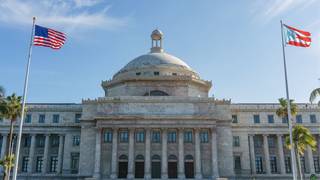
Democracy Now! co-host Juan González reports Congress held two hearings on the Puerto Rican debt crisis Thursday after House Speaker Paul Ryan set a March 31 deadline to pass a bill that addresses the issue. Democrats and Republicans are divided on what action to take. Democrats have proposed a “super-bankruptcy” that would allow the U.S. territory to settle its debts with creditors under a restructuring deal. Republicans want a control board if it provides financial assistance, as has happened in places like Detroit. But González notes Puerto Rico has objected to such control since it is a self-governing territory.
Transcript
AMY GOODMAN: Juan, before we go to our next segment, you wrote an interesting piece in the New York Daily News about hearings on Puerto Rico, an issue that did not come up in the Republican presidential primary debate, nor the Democrats.
JUAN GONZÁLEZ: Well, it actually hasn’t come up in any of the debates. But there were two hearings in the House of Representatives in separate committees yesterday, because Speaker Ryan has set a March 31st deadline for a bill to be passed in the House of Representatives to address the financial crisis in Puerto Rico. And so the two House committees immediately began to work this week.
But the problem is there’s a huge divide between the Democrats and the Republicans as to how to address the Puerto Rico crisis. Antonio Weiss, who’s the Obama administration’s point person in Treasury, testified at one House hearing, and he urged two major things that had to be done immediately on Puerto Rico. One is the Congress passing “super-bankruptcy” to allow the territory to consolidate all of its debts and have a universal settlement with all the creditors in a restructuring deal, something that virtually all the Republicans on the panel questioned as to whether that would create a huge crisis with the financial industry and also whether that would mean that other states would end up having to have the increased borrowing costs for their bonds as a result of Puerto Rico’s default.
The other big issue is what kind of financial controls will the Congress exercise over Puerto Rico in any kind of assistance that’s given to the island. And Weiss urged the—many Republicans want a direct financial control board, something like what happened in Detroit or what’s happened in Washington, D.C., where a group takes over—a financial control board takes over the finances of an entity that is virtually bankrupt. But Weiss reminded the Congress that Puerto Rico is a self-governing territory, and you cannot have the same kind of direct financial control over Puerto Rico that you would over a city. And that’s become another major issue. So I’m not sure that any settlement is going to be reached. But Weiss warned the Congress that Puerto Rico has another $400 million bill due May 1 and $2 billion in debt payment due July 1, and it cannot possibly pay those bills, as well. So the issue is how quickly will the Congress act based on Ryan’s promise, and we’re going to see what happens in the future.
AMY GOODMAN: And, of course, we’ll continue to follow it. Thanks, Juan, for great reporting.












Media Options